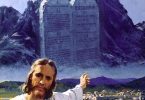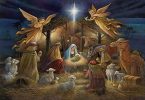11th Sunday of Ordinary Time (Year B)
Scriptures: Ez. 17:22-24; Ps. 91:2-3,13-16; 2 Cor. 5:6-10; Mk. 4:26-34
The present situation in our diocese is very bad. We are one of the leading districts in our state as far as the COVID pandemic is concerned. Our mortality rate is very high. We do not have medical facilities. We are rocked by one after another tragedy in the recent past. We had a cyclone which left devastating effects. This week we are expected to battle with the heavy rainfall. The black fungus has already found in some patients. We have been praying to God. But it seems God has given us his deaf ears. Is God listening to our prayers? This is the question that must have been bothering us?
Today’s liturgy tells us to trust in God, He is at work. In the first reading, the Prophet Ezekiel writes to the people of exile in Babylon who had lost hope. The Davidic dynasty was almost over. The young and promising people of Israel had become slaves. The prophet himself was one of them. The prophet gives an allegory of the cedar tree. The cedar tree has very rich symbolism. The tree was considered strong and durable, graceful and beautiful, high and tall, fragrant, etc. Cedarwood was widely used in building temples, palaces and ships. King Solomon had made a chariot of Cedar for himself. Cedar was used for preparing the water of separation and to purify leprosy (Lev. 14:4-7). Above all, the cedar tree represented Davidic monarchy.
The importance of the cedar tree is seen while it appears seventy-two times in the Bible. In such a background, prophet Ezekiel says that God will take a tiny shoot from the Cedar. He will replant it on the mountain. It will become the mighty tree. It will be admired by the rest of the trees. The birds will come to shelter in its branches. Ezekiel recognizes God’s mighty power is at work. No one was at their side, yet God takes the initiatives to replant the Cedar i.e. the new Israel.
Jesus also uses the same expression in the Gospel today. The context was also very difficult when the Gospel of Mark was written. The two pillars of the church, St Peter and Paul were put to death, the persecution had started against the Christians. The Roman emperor had blamed the Christians for the fire in Rome. In such circumstances, St. Mark narrates today that Jesus gave two parables on the kingdom of God; both the parables are related to seeds.
In the first parable, Mark the Evangelist mentions the seed’s growth. The growth is slow, mysterious and unnoticeable. The growth is continuous but silent and slow. The sower does not make any efforts in the progress of the crop. He only plants and then the land produces shoot, then the ear, then the full grain in the ear. It is God’s initiative that brings forth growth. God works in ways we don’t understand. The second parable of the mustard seed also gives a similar lesson. The mustard seed had a simple and humble beginning. But the ending was great. The tiny seed was transformed into a big shrub. Its branches give shelter to the birds. God has the capacity to produce from the tiny seeds. He takes initiatives. He is the one who brings forth growth.
Each of these readings helps us to recognize the most important fact that in the most difficult situation, God is at work; He is not seen doing anything but when we see the seed that was planted or the cedar which was planted has become a huge tree, we realise that it is none other our Mother Church. According to Ezekiel, the shoot of the cedar i.e. Jesus, the son of David planted a seed in a small group of disciples. They went about preaching the good news. Jesus started with the band of twelve disciples. The Catholic Church has a 1.2 billion population. The growth has been slow and steady.
The message of the liturgy today is God is in total control of everything. We need to trust in Him, He is at work. However, we also need to work and contribute on our part. St. Paul in the second reading says that we need to do everything to please the Lord. One of the things that God wants us to do is to sow seeds of the word of God in the lives of people. It will make us worthy to stand before the Lord on the day of judgement.
St. Anthony who feast day is celebrated today. He did everything to please the Lord. He gave up his inheritance, he left the St. Augustine monastery and joined the Franciscan order, he lived in simplicity and poverty, he led prayerful life. He preached the word of God and brought many souls to God.
We are called to imitate St. Anthony in our lives. Ezekiel, St. Paul and St. Anthony believed that God is at work in most difficult moments. But they also worked for the kingdom. What about us? Are we working to spread the kingdom of God?






